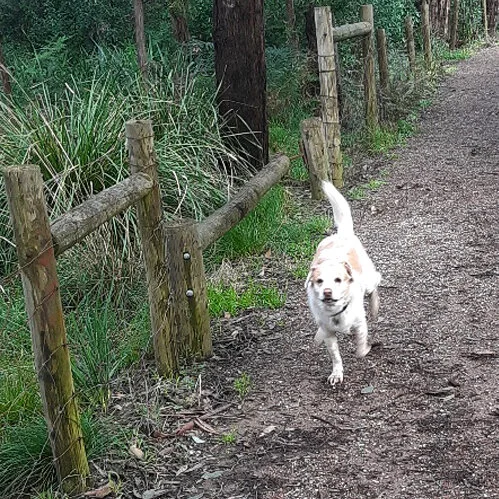by Roland Ashby
As I struggle to come to terms with Melbourne’s second lockdown, I am starting to look at our family dog Bessie with new, and envious, eyes. Her simple joy in life has not wavered throughout the pandemic. Each morning she greets me with gusto as she gleefully anticipates her first walk of the day. Each day, it seems, offers a new banquet of olfactory delights. And surely that’s a smile I discern as she leaps through long grass, or frolics in fresh puddles.
It’s her simple good-natured love and exuberance that poet Mary Oliver calls “the shining rudimentary soul”. Dogs have much to teach us bipeds, as we lumber about weighed down by thoughts of the past or the future, failing to notice the present.
The Vietnamese Zen Buddhist Thich Nhat Hahn believes that by giving our pure attention to the present moment we can transform our lives. Walking can become a beautiful meditation, he says, “If we do not think of the future or the past, if we know that life can only be found in the present moment.” We do this by not walking in order to arrive somewhere, but by slowing our steps, breathing deeply, pausing to observe the beauty around us, and looking closely at a leaf, or a flower or tree, or the sky, as if seeing it for the first time. Taking time to wonder and be astonished. With one step and a deep breath you can enter “the here and now, the Kingdom of God”. Body, mind and spirit becoming one.
“If you feel happy, peaceful and joyful while you are walking, you are practising correctly,” he says, and “Each step we take will create a cool breeze, refreshing our body and mind. Every step makes a flower bloom under our feet.”
The Christian tradition, too, recognises the sacred in nature, and its power to nourish our souls. One of the Church’s greatest theologians, Thomas Aquinas, believed that God is revealed in both nature and the Bible. “Sacred writings are bound in two volumes – that of creation and that of the Holy Scriptures.”
This accords with the insights of the mystics. Thirteenth century German mystic Mechtilde of Magdeberg said, “How does God come to us? Like dew on the flowers. Like the song of the birds! Yes, God gives the Godself with all creatures wholly to me.”
Young children also experience wonder and awe in the presence of nature. Perhaps this is one reason why Jesus said that only by becoming little children again can we enter the Kingdom of Heaven (Matt. 18:3). “Heaven lies about us in our infancy” Wordsworth exclaimed in his Immortality Ode, while lamenting that the powers of perception he experienced as a young child - The earth/and every common sight/To me did seem/Apparelled in celestial light – dimmed with age.
